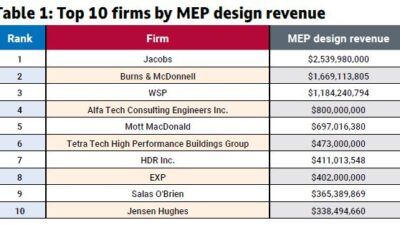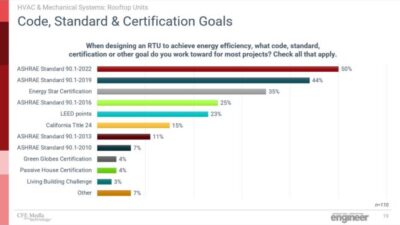While base salaries went up slightly, nonsalary compensation decreased in this year’s salary survey

Engineering salary survey insights:
- The average engineering professional is 51 years old, plans to retire in 2038, and worked on approximately 33 total projects last year.
- The average engineering professional earned a base salary of about $112,600 in 2021, a 3.2% increase over 2020 data. Nearly seven out of 10 respondents reported an increase in total compensation between 2020 and 2021.
- Three-quarters of engineers received a form of nonsalary compensation in 2021 (e.g., bonus, profit sharing, stock shares); the average amount awarded was about $13,000.
The average base salary among engineering professionals has increased 13.6% since 2014, the first year in which Consulting-Specifying Engineer conducted research on salary compensation, from $99,100 to $112,600. Average nonsalary compensation has also increased by 2.4% since 2014.
The eighth annual Consulting-Specifying Engineer salary survey of mechanical, electrical, plumbing, fire protection and lighting engineers shows that the average base annual salary in 2021 was $112,624, a slight increase over $109,093. Average nonsalary compensation was $13,022, a dramatic decrease from the $20,893 reported in 2021.
The average 2021 salary among survey respondents was an increase of 3.2% over 2020 data. More than half (53%) of this year’s respondents received a salary of more than $100,000. Seven out of 10 (69%) respondents reported their total compensation increased from 2020 to 2021. Nearly a third (34%) said the increase was up to 4%; 15% said 5% to 9%; and 20% said 10% or more. About a quarter (24%) reported no change in compensation.
Nearly half (47%) of all respondents said they worked at a consulting engineering firm, 14% work for an architectural engineering firm and 12% indicated they were either an in-house engineer for government agency, public utility company or industrial/commercial institutional firm. Only 10% indicated they worked for a design/build, construction/contracting firm. These numbers are based on the anonymous responses of professionals from a variety of engineering disciplines and at different levels in their professional career.
From the 2021 study results, 31% are 60 or older, 27% are 50 to 59 years old, 21% are 30 to 39 years old and 14% are 40 to 49 years old. Only 7% are under 30 years old.
Younger staff, defined by the U.S. Department of Labor as 40 or younger, equate to 29% — about the same as last year’s survey respondents, which reported 27% in this age group. See Figure 1 for the comparison of age groups over the past several years.

Challenges this year included:
Not enough junior team members to prepare for the future: 46%
- Not enough people working on a project: 37%
- Poor communication between consultants, architect, etc.: 33%
- Issues related to COVID-19: 28%
- Codes and standards: 22%
Total compensation went down slightly in 2021. The decrease occurred mostly in the nonsalary compensation. Nonsalary compensation was awarded for two primary reasons:
- Company profitability: 43%
- Personal performance or promotion: 42%
When comparing compensation, the numbers changed again this year. Mechanical engineers brought in $129,829, a decrease from $133,211 in 2020. Electrical/power system designers came in next, earning $125,167, a slight decrease from $126,037. Those who specify fire protection/life safety systems made an average of $122,572, a decrease from $131,809 in 2020. Those who primarily specify lighting systems earned $95,782 in 2021, an increase over $91,698 in 2020.
See the compensation tables for a more detailed breakdown.


Changing employers
According to the survey, 11% of respondents are looking to change jobs in the next year and 22% aren’t sure, meaning about one-third of employees could be looking for a new position. Because this study was conducted well into the COVID-19 pandemic, reluctance to change to a new company is likely due to the wildly fluctuating job market, a backlog of work and the rosy outlook for many engineering firms.
As seen in past studies, the majority of respondents are either very satisfied (34%) or satisfied (44%) with their jobs, equal to 78% of respondents satisfied. This is down from 2020 data, where the two satisfaction numbers equaled 91%.
Survey methodology
A survey was emailed to Consulting-Specifying Engineer audience members and information was collected in September 2022. A total of 271 qualified responses were returned, with a margin of error of +/-6% at a 95% confidence level. Participants frequently had the option to select more than one response, thus totals do not always equal 100%. Download the full study.



